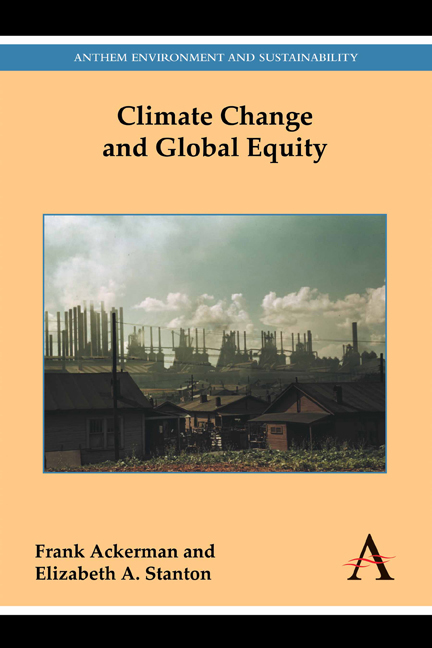Book contents
- Frontmatter
- Contents
- Introduction
- Publication History
- Part I Perspectives on Climate and Equity
- Part II Analyses of Climate Damages
- Part III Theory and Methods of Integrated Assessment
- Part IV Applications of Integrated Assessment Models
- Chapter 11 Climate Risks and Carbon Prices: Revising the Social Cost of Carbon
- Chapter 12 Epstein–Zin Utility in DICE: Is Risk Aversion Irrelevant to Climate Policy?
- Chapter 13 Fat Tails, Exponents, Extreme Uncertainty: Simulating Catastrophe in DICE
- Chapter 14 Climate Damages in the FUND Model: A Disaggregated Analysis
- Chapter 15 Climate Policy and Development: An Economic Analysis
- Appendix Supplementary Data for Chapter 3
- Notes
- References
Chapter 14 - Climate Damages in the FUND Model: A Disaggregated Analysis
from Part IV - Applications of Integrated Assessment Models
Published online by Cambridge University Press: 03 November 2017
- Frontmatter
- Contents
- Introduction
- Publication History
- Part I Perspectives on Climate and Equity
- Part II Analyses of Climate Damages
- Part III Theory and Methods of Integrated Assessment
- Part IV Applications of Integrated Assessment Models
- Chapter 11 Climate Risks and Carbon Prices: Revising the Social Cost of Carbon
- Chapter 12 Epstein–Zin Utility in DICE: Is Risk Aversion Irrelevant to Climate Policy?
- Chapter 13 Fat Tails, Exponents, Extreme Uncertainty: Simulating Catastrophe in DICE
- Chapter 14 Climate Damages in the FUND Model: A Disaggregated Analysis
- Chapter 15 Climate Policy and Development: An Economic Analysis
- Appendix Supplementary Data for Chapter 3
- Notes
- References
Summary
We examine the treatment of climate damages in the FUND model. By inserting software switches to turn individual features on and off, we obtain FUND's estimates for 15 categories of damages, and for components of the agricultural category. FUND, as used by the US government to estimate the social cost of carbon, projects a net benefit of climate change in agriculture, offset by a slightly larger estimate of all other damages. Within agriculture there is a large benefit from CO2 fertilization, a moderate cost from the effect of temperature on yields and a much smaller impact of the rate of change.
In FUND's agricultural modeling, the temperature-yield equation comes close to dividing by zero for high-probability values of a Monte Carlo parameter. The range of variation of the optimal temperature exceeds physically plausible limits, with 95 percent confidence intervals extending to 17°C above and below current temperatures. Moreover, FUND's agricultural estimates are calibrated to research published in 1996 or earlier. Use of estimates from such models is arguably inappropriate for setting public policy. But as long as such models are being used in the policymaking process, an update to reflect newer research and correct modeling errors is needed before FUND's damage estimates can be relied on.
Introduction
The FUND model of climate economics, developed by Richard Tol and David Anthoff, is widely used, both in research and in the development of policy proposals. It was one of three models used by the US government's Interagency Working Group on the Social Cost of Carbon (2010). The Working Group's “central estimate”1 of the social cost of carbon (SCC), i.e., the monetary value of the incremental damages from greenhouse gas emissions, was $21 per ton of CO2. FUND differs from the other two models used by the Interagency Working Group, DICE and PAGE, in at least two important respects. First, it produces the lowest central estimate of the SCC, $6, compared with $30 in PAGE and $28 in DICE. (Here and throughout, SCC estimates are in 2007 dollars per ton of CO2.) Second, FUND is far more complex than the other models, with, among other features, 15 major categories and additional subcategories of climate damages, each based on a separate analysis and estimated for each of 16 regions of the world.
- Type
- Chapter
- Information
- Climate Change and Global Equity , pp. 203 - 216Publisher: Anthem PressPrint publication year: 2014



